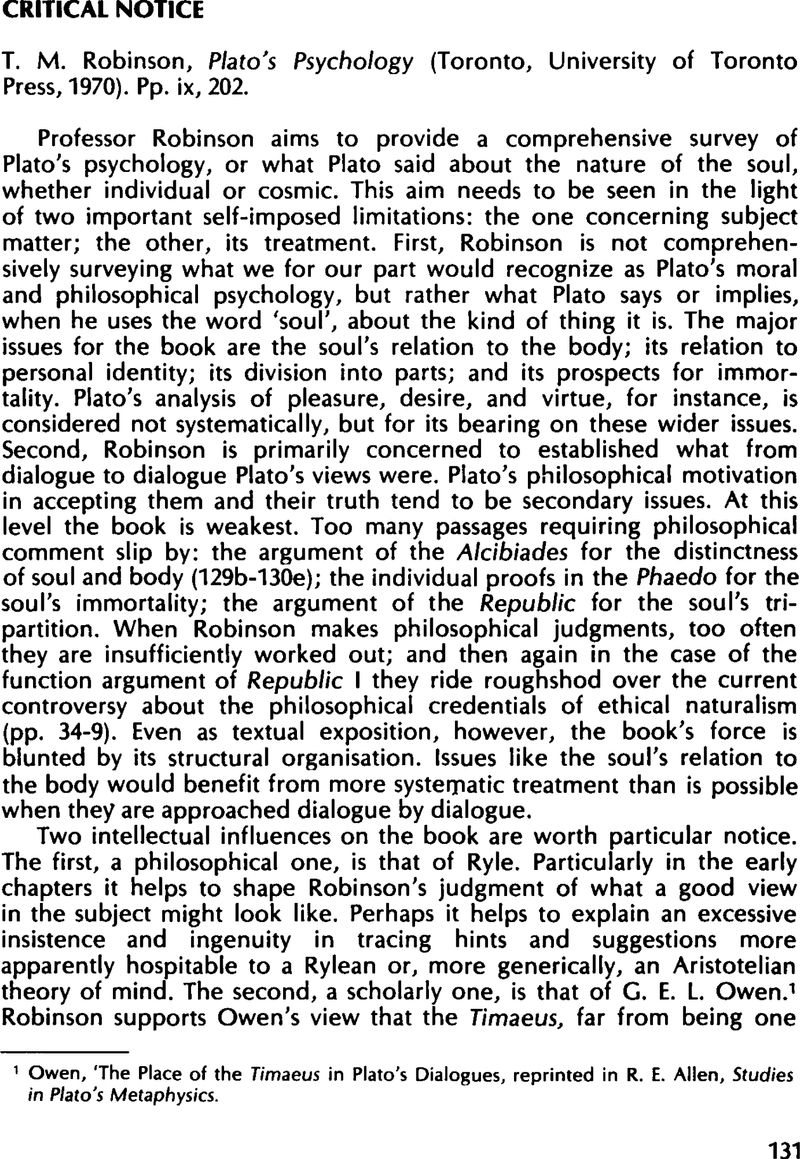Published online by Cambridge University Press: 01 January 2020

1 Owen, ‘The Place of the Timaeus in Plato's Dialogues, reprinted in R. E. Allen, Studies in Plato's Metaphysics.
2 The argument is also revealing about Plato's view of the relation between persons and souls. In particular, its apparent subject alters in its course. For while it begins as an argument about the slave boy, it ends as one about his soul. This is clear when Socrates infers that he (the slave boy) must have had knowledge when he (now his soul) was not a man (85e11-86a2).
3 Robinson flirts with the possibility (pp. 21–2; 32) that in the Phaedo Plato sometimes distinguished the person from either soul or body. Socrates says, for instance, that the philospher should stand off from the body and direct attention to his soul. The explanation surely is, however, not that the philosopher is something beyond body and soul, but that he should pay more attention to himself or better to his most proper concerns than to his body and its proper objects. Robinson gives the correct explanation later on p. 48.
4 Robinson argues that since the thumos can be corrupted, it can oppose the dictates of reason. If it can, Plato fails to make use of this claim for his argument in which it would be materially important. For a different account of the significance of the corruptibility of this part of the soul, see Terry Penner, ‘Though and Desire in Plato’ printed in Vlastos (ed.), Plato II: A Collection of Critical Essays, esp. p. 111, n. 10.
5 As claimed, for instance, by E. R. Dodds in The Greeks and The Irrational, p. 214 and n. 32, p. 228.
6 I find Robinson's account of the significance of the Glaucus analogy unconvincing. Robinson does not sufficiently consider 611e which by focusing on the soul's love of wisdom points the other way.
7 G. Vlastos, ‘The Disorderly Motion in the Timaeus’ and ‘Creation in the Timaeus: Is it a Fiction?’ printed in Allen, Studies in Plato's Metaphysics, pp. 379–419; and Hackforth, R. ‘Plato's Cosmogony (Timaeus 27d ff.)', Classical Quarterly NS IX (1959), pp. 17–22.Google Scholar
8 Owen, Ibid., p. 338.
9 Vlastos, Ibid., p. 415.
10 Vlastos, Ibid., p. 414, n. 1.
11 For a good statement of a similar point, see Vlastos, G. ‘Socratic Knowledge and Platonic “Pessimism”’. Philosophical Review (1957), pp. 226–38Google Scholar and esp. pp. 232–3.
12 There is some uncertainty about the nature of the contribution made by the soul. For a good discussion of the difficulty, see Cooper, J. M. ‘Plato on Sense Perception and Knowledge: Theaetetus 184 to 186’, Phronesis (1970), pp. 123–46.Google Scholar